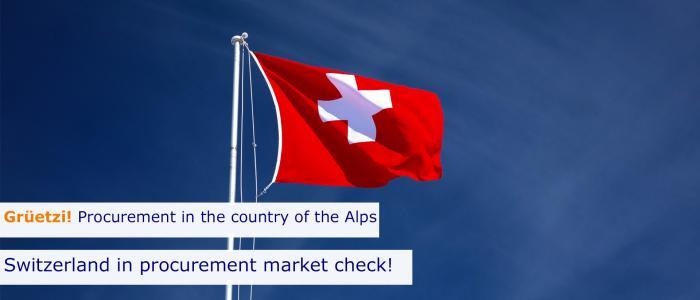Procurement market Switzerland – Our neighboring country in check
Even though Germany is not in the last sixteen of the World Cup, our neighboring country, Switzerland, is still in. Thus our World Cup series continues and we look together at the country in which Kloepfel Consulting is also represented. Part 5 of our series.
Procurement in the country of the Alps
Switzerland has grown by over 1% per year since 2007, mainly due to immigration, and has 8.5 million inhabitants by now. Due to the appreciable revaluation of the Swiss franc, Switzerland has recorded relatively flat growth of 0.5% of GDP per capita since 2011. With GDP of CHF 668 billion and USD 78,813 per capita, Switzerland is in fourth place worldwide.
Switzerland is very competitive in the research and innovation area. They spend the most on research and development (R & D) in relation to their gross domestic product. The private sector accounts for more than two-thirds of Swiss R & D expenditure, which currently is nearly 3 % of GDP or more specifically over 16 billion Swiss francs. Public research funding focuses primarily on researchers’ own initiative, the principle of competition and on international cooperation.
After forty years of fear of the decline of the workplace, Switzerland is still the most industrialized country in the world. China earns only $1500 per capita in industry. Of the other leading industrial nations, Germany generates $7,700, five times as much as China, and the USA $6,000, four times more. At the top of this rating is Switzerland with $12,400 per capita.
Switzerland’s banking industry is one of the most important in the world. Due to the economic and political stability of the country as well as the main activity of asset management, it has a very good reputation. The banking sector accounts for around CHF 35.9 billion, which corresponds to 6.7 percent of the total GDP.
Switzerland exports worldwide. The most important export markets are Germany with CHF 45 billion (15.3%), the United States with CHF 36 billion (12.3%) and China with CHF 24 billion (8.1%). For years, the pharmaceutical industry has been the leading export industry, with CHF 99 billion or 33.4% of the total export volume of the country. Of course, Swiss stereotypes are not left out. Swiss precision instruments, watches and jewelry make up CHF 47 billion. In addition to these goods, machinery and food are also exported.
Labor market Switzerland
In 2017, around 5.0 million people were employed, around 400,000 more compared to 2016. The unemployment rate in 2017 was 3.2 percent, with around 143,140 unemployed. The backbone of Switzerland is the dual education system with its highly skilled staff. Strong individual commitment in further education and leading universities (ETH, EHL) support the performance of the working population. The Confederates are very busy with high annual working hours. In the EU28 / EFTA country comparison, Switzerland is well ahead of the EU28 average of 39 hours and 24 minutes, with 42 hours and 36 minutes of actual weekly working hours among full-time workers. On the other hand, Switzerland also has a high proportion of part-time workers. The incidental wage costs are still pleasingly low.
SMEs and large enterprises
More than 99% of all companies in Switzerland are SMEs, more specifically small and medium-sized enterprises with less than 250 employees. Around 90% of these companies are microenterprises with less than 10 employees. The average size of the company is just over 7.5 employees.
One of the largest companies is the food group Nestlé. With sales of around CHF 89.8 billion last year, Nestlé is also one of the largest companies in the world. But also less well-known trading companies, such as Glencore International AG with a high business volume, are worth mentioning in Switzerland.
The diversified retail groups Coop and Migros are also among the large companies. Migros in particular produces a high proportion of its products in its own industrial plants. The successful local retailers are feeling the strong competition from Aldi and Lidl, online trade and shopping tourism in nearby foreign countries.
Energy
Even today, water is responsible for two thirds of the country’s electricity. Formerly profitable companies, mostly in the public sector, are under strong pressure due to the spreading subsidies in Europe. Even the environmentally friendly waterworks are struggling with the low market price level.
Conclusion
Switzerland continues to build on a strong workplace, remains innovative and exports its products worldwide. Switzerland is also one of the world’s leading locations for the services sector with banks, insurances and retailers.
About the author
Dr. Stephan Hofstetter
Dr. Stephan Hofstetter, a Swiss partner at Kloepfel Consulting, manages projects to optimize structures and processes in purchasing as well as procurement costs in medium-sized companies throughout the DACH (German speaking) region.
Would you also like to benefit from the know-how of our experts? Then feel free to contact us at +49 211 875 453 23 or at info@kloepfel-consulting.com.
Part 1: Procurement market Russia – The host country of the World Cup in the check
Part 2: Procurement Market Mexico – More than just Siesta!
Part 3: Procurement market Sweden – How strong is our preliminary round opponent?
Part 4: Procurement market South Korea – The opponent of the World Cup in the check
Part 6: Procurement market Brazil: Is everything sweet in the land of the Sugarloaf Mountain?



Comments are closed.